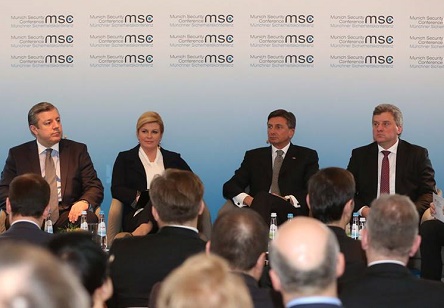PM Kvirikashvili: Georgia wants its EU integration efforts adequately assessed

Georgia is implementing ambitious reforms to get closer to the European Union (EU) and the country requires proper recognition of these efforts.
This message was voiced by Georgia’s Prime Minister Giorgi Kvirikashvili in Germany last night.
Kvirikashvili participated in the panel discussion "Future direction to European integration" within the 52nd Munich Security Conference.
- The discussion was moderated by Foreign Minister of Austria Sebastian Kurz and the panel speakers alongside Kvirikashvili were President of Macedonia Gjorge Ivanov, President of Slovenia Borut Pahor, President of Croatia Kolinda Grabar-Kitarovic, President of Montenegro Milo Dukanovic and Prime Minister of Kosovo Isa Mustafa.

Photo by the Prime Minister's Press Office
Asked why Europe was attractive for Georgia, Prime Minister Kvirikashvili said his country had only one future - a European future.
"We do not have other alternative except for approximation with the EU, adopting European values and building constitutional democracy in the country,” Kvirikashvili said.
"Therefore, our recognition is crucial to ensure our persistence and determination. Our message is that successful finalisation of the visa free regime is crucial to us, since free trade is impossible without an opportunity of visa free travel to Europe for our citizens and businessmen.”
"I consider that this will be an ideal continuation of the success that we have achieved this far.”
Watch Kvirikashvili's speech here.
Kvirikashvili said his team strived to ensure all members of Georgia's society supported the country's European goals.
"In terms of visa liberalisation, we successfully finalised technical requirements prescribed by the Action Plan. The Government of Georgia introduced important reforms, including those not very popular in traditional society. Hence, we require this efforts to be assessed,” the Prime Minister added.
Kvirikashvili said Georgia was in the process of building its European future; the country gradually fulfilled requirements of its Association Agreement agenda and was ambitious about:
- Transformation of post-Soviet institutions into European ones;
- Approximation of Georgia's political standards with European standards;
- Free trade with Europe; and
- Visa-free travel
The PM added he hoped Georgia would obtain the last point – visa-free travel - soon.
"Georgia has already finalised implementation of the Visa Liberalisation Action Plan and, the most importantly, we are building our European future based on common history and vision," he said.
Kvirikashvili said despite existing challenges, Georgia was persistent in its European integration efforts.
"We face a numbers of challenges: temporary loss of control over the territories occupied by Russia; problems concerning refugees in the region. Nevertheless, we are optimistic about Georgia's future and hope that we will achieve systemic and institutional transformation of the country in compliance with the European standards.
"We also look forward to future enforcement of transportation links with Europe and we hope that through this we will be able to link Europe and Asia, Europe and regional states including Iran, which now has a chance to cooperate with the international society.”
Yesterday was the second day of the annual Munich Security Conference – the world’s largest gathering of this kind bringing together nearly 350 senior figures from more than 70 states.
 Tweet
Tweet  Share
Share